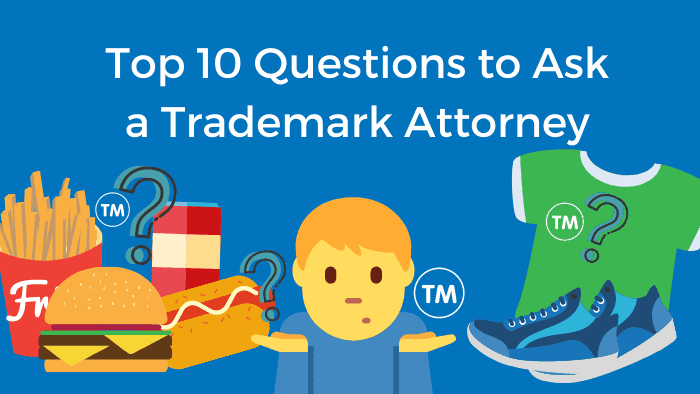A trademark attorney is essentially a licensed legal professional qualified to handle matters regarding trademark law. In the U.S., unlike other countries, the term “trademark attorney” is not strictly defined.
A trademark attorney is still considered a general legal professional and may, in fact, offer counsel regarding matters other than trademark law. Which means that, technically speaking, they are attorneys who specialize in—and prefer to handle—trademark law.
To give you an idea of what exactly a trademark attorney can help you with, I put together the top most common questions people are known to ask them.
Do I need a Registered trademark?
In the United States, using a name to refer to the offered goods or services automatically creates a trademark for that name. Think “Coca-Cola” or “Google.” When you order a “coke” to go with your meal, you’re not expecting just any carbonated beverage, like a Pepsi or a Dr. Pepper. You want a drink from the Coca-Cola Company. Likewise, when you tell someone to “Google it,” chances are they’re not going to use just any random search engine, like Bing or Wiki.com.
If you are selling branded products or services you likely have a trademark but what you don’t have is a registered trademark. The federal registration symbol, which is the ®, represents a regulated trademark by law.
Registered trademarks are important because it ensures your trademark is not similar to anyone else’s. This avoids potential lawsuits. Furthermore, if you are not registered the burden of proof is much higher should someone copy or infringe your trademark.
What do I need to do to make my trademark official?
You would have to have it federally registered.
The United States Patent and Trademark Office (USPTO) is the go-to department for registering trademarks and obtaining patents. Most medium and large businesses have their trademarks federally registered in order to maximize brand recognition and profits.
However, keep in mind that there is no one-size-fits-all answer. Different businesses have different needs and different priorities. A company that’s aiming for global expansion, for instance, will definitely want their trademark registered. On the opposite end, a local business content to resell items rather than manufacture and sell their own might not have the immediate need to.
Before you register your trademark, it is also important to know whether or not your trademark is potentially infringing on existing trademark in use. Your mark doesn’t even need to be exactly identical to said trademark. If it’s confusingly similar, your opponent may have a strong case to make.
In such cases, it’s better to discuss this in full with a registered trademark attorney. Their legal counsel for your questions and concerns regarding how to trademark a business name – specifically your business name – will prove invaluable.
Can I handle the trademark registration for someone else’s business name? Am I liable for anything if I do?
Some business owners may ask their staff, co-owners, or colleagues to handle the trademark registration application. They may even be compensated for the effort.

But we must strongly advise against such practices.
If you are not a licensed attorney, you cannot file someone else’s trademark application on their behalf—even if you have legal knowledge or prior experience. Everyone’s case is different, and something like trademark registration should not be taken lightly. This is to protect all parties involved from potential legal issues.
They need to either file it on their own or hire a trademark attorney to file it for them.
How long does a trademark last?
The good news is that unlike copyrights and patents, trademarks can technically last forever. All one needs to do to maintain their trademark rights is to keep using it with regards to the goods and/or services they offer.
Only when they stop using their mark in that context (or when they change the intention behind the trademark usage) will the rights cease.
How will the USPTO know that you’re still actively using your trademark in the same context? You’d have to file a renewal after:
- Five (5) and six (6) years of registration
- Nine (9) and ten (10) years of registration
- Every ten (10) years thereafter
This is to ensure that your trademark remains up-to-date in the USPTO’s database. Failure to file will result in a cancellation of the trademark’s registration with the USPTO. However, it will not result in trademark abandonment in the common law sense. The trademark may even be revived under the right circumstances.
Just remember that everyone’s case is different, and the answers here are generalized. If you have reason to believe that your circumstances are special, we highly recommend hiring a trademark attorney to examine and handle your situation exclusively.
Should I file a trademark registration using my name or my company’s name?
This is where federal trademark registration can become very confusing. Business owners often end up filing an application using their own name and address rather than the business’s name and address—aka the entity that will actually be using the trademark.
Filing a trademark using an individual’s details can lead to a lot of complications down the line. In the best case scenario, you’d be prompted to reassign the registration to their business.
The worst?
The application is voided because it was filed under the wrong entity. That basically throws all the money and time you spent on the registration down the drain.

The cost of a trademark isn’t necessarily expensive per se, but the processes and fees for it can stack up if you aren’t careful.
Can I just use the TESS search on the USPTO website to conduct a trademark search before filing my application?
TESS stands for Trademark Electronic Search System, which is essentially the USPTO’s official trademark database and search engine. Ideally, you can use TESS to find registered or applied trademarks that are:
- Similar to your trademark
- Used on related products or for related services, and
- Live
There’s a high chance that your trademark registration won’t be approved if there are indeed existing registered or applied for trademarks that meet one of the three criteria.
If there’s a trademark that meets all three, your trademark application will be prevented.
TESS is a great place to start, but it’s not as comprehensive as one would hope. The search results it returns are exact hits. This would be fine if the USPTO only issued rejections for identical marks. However, marks that are considered “confusingly similar” with an existing trademark are rejected as well, and TESS can’t analyze or filter look-alike or similar trademarks.
This is where a trademark attorney can help you. If you want to be 100% sure that your trademark isn’t similar to—and cannot be confused with—other live registered trademarks, you can’t rely on TESS alone.
Trademark attorneys can conduct a far more comprehensive trademark search for you using their own systems and specialized software.
Is my trademark “confusingly similar” to another trademark? What does that mean, and how can I avoid that?
“Confusingly similar” runs the risk of being subjective because it relies heavily on visual judgment. This is definitely where a licensed professional would need to step in, as they can best guess what the USPTO would consider enough of a difference to approve a trademark registration application.
But for the sake of clarity, it’s best if you strive to do more than the bare minimum to keep your trademark unique and dissimilar from all others.
What does this mean?
Don’t just add “THE” to the front of your mark. Don’t just change the colors and font face. Don’t just change the spelling. Don’t just add an underline, a strikethrough, or some other minor embellishment.
If two marks being used for the same goods/services are visually and/or verbally similar, then there’s a good chance the second one who files for federal trademark registration will be denied.

If my trademark is federally registered in the U.S., does that mean it’s recognized in other countries?
Trademark law is jurisdictional, so no. Definitely not.
Other countries have their own laws and processes needed to file trademark registration applications and obtain subsequent rights. They also have different guidelines and parameters regarding trademark registration. For instance, in China, trademark rights are granted to the first to register. In the U.S., trademark rights are established based on first use.
A good example of this is popular vehicle manufacturer, TESLA.
An individual by the name of Zhan Baosheng was actually granted the rights to TESLA in China because he filed the registration application first. Tesla Motors, Inc. eventually managed to reach a settlement, but you can bet a lot of resources had to be spent for it.
If you want to register your trademark in different countries, you’d have to follow their laws to the letter. Just be aware that securing an international trademark has its advantages and disadvantages.
If you want to be absolutely certain obtaining international trademark registration is right for you, definitely seek the professional counsel of a trademark attorney. The wrong decision can be costly.
Is it true that companies are obliged to sue every single potential infringement if they want to present a strong case during an actual infringement lawsuit?
This may be the case for larger corporations with bigger names, but bear in mind that lawsuits can be expensive and time-consuming. What’s more, we’ve already mentioned how “confusingly similar” is subjective, which runs the risk of differing opinions in certain situations.
As a result, companies that chase each and every threat to their trademark may end up hurting themselves publicly and financially.
Sure, bigger companies might have the funds to do so, but this level of aggressiveness may warrant public scrutiny. They could, potentially, come off as big corporations bullying or pushing around smaller businesses just because they can.

From a legal perspective, it’s best that businesses set boundaries or agree—on a whole—what they would consider similar enough to warrant a lawsuit. At the end of the day, the public can make its own judgments regarding whether or not the trademark posed an actual threat.
What can a trademark attorney do for me?
If said trademark attorney is licensed to practice law in the U.S.? Quite a bit, actually.
A trademark attorney can provide valuable legal counsel that you can depend on (which is endlessly better than second-guessing yourself) regarding your entire trademark registration application. They can determine if your trademark legally qualifies for protection and help you select the correct filing basis for it. They can also field all questions, concerns, or refusals to register your trademark from a USPTO trademark examining attorney.
Furthermore, they can handle potential challenges against your trademark, select an appropriate way to best showcase how your mark will be used in commerce, and prepare the filing documents needed to maintain your USPTO registration.
And that’s all on top of the other ways we’ve listed here (i.e., trademark search, filing, etc.).
Legal counsel from a licensed U.S. trademark attorney is invaluable. Working with them is essentially an investment that ensures you won’t waste money, time, and resources later on.
Conclusion
To recap, these are the questions people typically ask trademark attorneys:
- Do I need a trademark?
- What do I need to do to make my trademark official?
- Can I handle the trademark registration for someone else’s business name? Am I liable for anything if I do?
- How long does a trademark last?
- Should I file a trademark registration using my name or my company’s name?
- Can I just use the TESS search on the USPTO website to conduct a trademark search before filing my application?
- Is my trademark “confusingly similar” to another trademark? What does that mean, and how can I avoid that?
- If my trademark is federally registered in the U.S., does that mean it’s recognized in other countries?
- Is it true that companies are obliged to sue every single potential infringement if they want to present a strong case during an actual infringement lawsuit?
- What can a trademark attorney do for me?
If you want to learn more about how trademark attorneys and dedicated intellectual property attorneys can help you, please feel free to reach out to us! At Bold Patents, we are more than happy to answer your questions.

